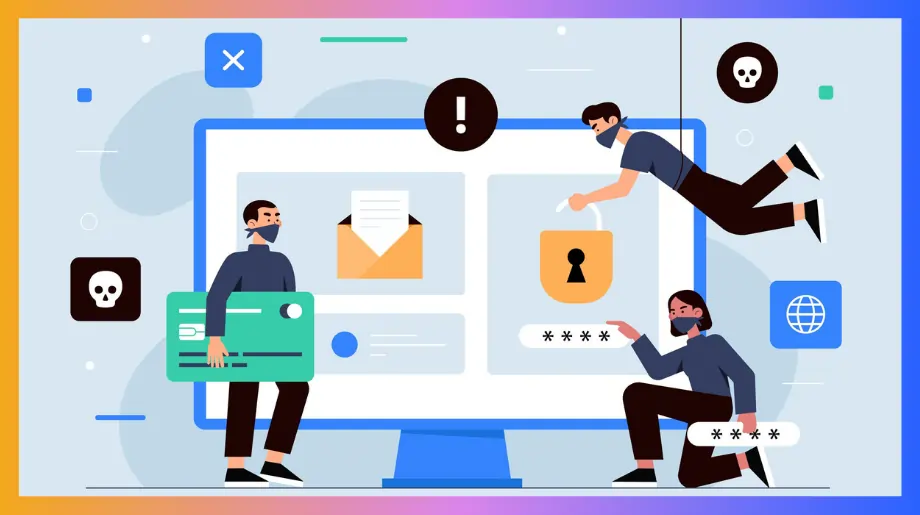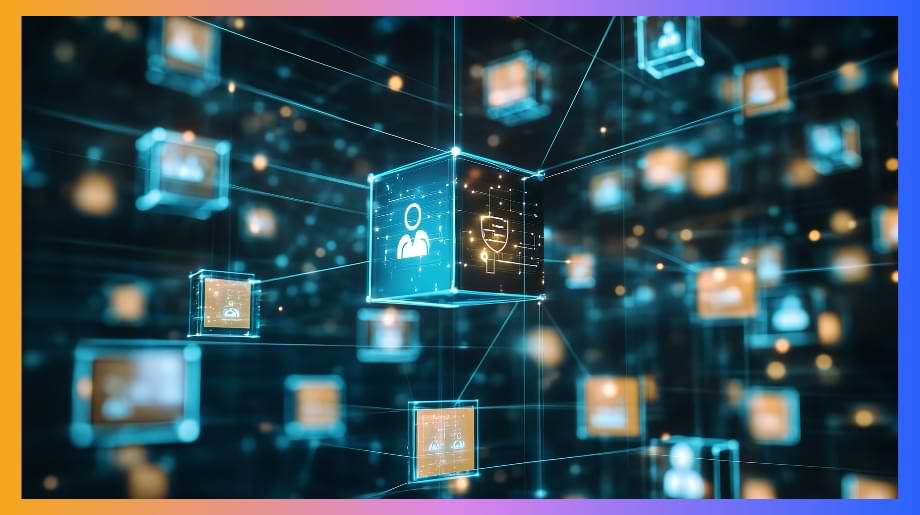Did you know that 91.1% of businesses prioritize data privacy if it can improve customer trust and loyalty? Well, we’ll cover how zero knowledge-proof applications that can do just that.
What is Zero Knowledge Proof or ZKP?
Zero Knowledge Proof (ZKP) allows for verifying data authenticity without revealing the data itself. Since data privacy is an increasing concern in digital transactions, maintaining confidentiality without revealing sensitive information can be a bit hard.
More importantly, ZKP improves security by making sure that only the necessary proof is shared, keeping the underlying data hidden.
How so? ZKP allows one party to prove to another that they know a value without transmitting the value itself, reducing the risk of data leaks. This method adds privacy in areas like authentication and blockchain, where trust and secrecy are paramount.
10 Zero Knowledge-Proof Applications and Use Cases
1. Decentralized Identity
Since decentralized identity systems rely on protecting user privacy while verifying credentials, maintaining security without leaking sensitive data can be challenging. Zero Knowledge Proof (ZKP) allows users to confirm their identities or specific attributes without revealing underlying details.
More importantly, ZKP supports trustless authentication processes, making sure that only the required proof is shared while keeping private information undisclosed.
How does it do this? Well, ZKP operates by confirming ownership or knowledge of specific data without transmitting the data itself. This is particularly effective in decentralized identity frameworks, where privacy and trust need to coexist.
2. Privacy in Financial Transactions and Audits
Privacy in financial transactions and audits is increasingly important for protecting sensitive data while meeting regulatory standards.
- Confidential Validation: Zero Knowledge Proofs allow verification of transaction accuracy without disclosing underlying details, preserving the confidentiality of sensitive data.
- Regulatory Alignment: ZKP methods support compliance by allowing secure reporting of financial figures without revealing proprietary or private information.
- Audit Transparency: These techniques create immutable records that validate data integrity for audits, creating trust without leaking sensitive financial details.
3. Proof of Financial Reserves and Balance
Since financial institutions often need to validate reserves and balances without revealing sensitive customer data, maintaining transparency while protecting privacy can be challenging. With Zero Knowledge Proof (ZKP), these institutions can prove the existence of financial reserves without disclosing the underlying account details.
More importantly, ZKP allows for secure verification that balances meet required thresholds without compromising client confidentiality.
How does that happen? ZKP confirms the accuracy of reserve claims by confirming the total assets or liabilities without revealing specific transactions. This creates trust in financial statements while safeguarding sensitive data, making the process both secure and efficient across different auditing systems.
4. Internet of Things (IoT)
The Internet of Things (IoT) involves vast networks of connected devices, making it essential to protect sensitive data and create secure communication between devices.
- Data Privacy: Zero Knowledge Proofs allow IoT devices to authenticate and verify transactions without disclosing the underlying sensitive data, preserving user privacy.
- Device Authentication: ZKPs allow that only authorized devices can interact within the network, preventing unauthorized access without revealing internal credentials or data.
- Secure Communication: With ZKPs, IoT devices can securely exchange information by verifying the accuracy of transmitted data, without revealing the contents to unauthorized entities.
- Scalability: As IoT networks expand, ZKPs help maintain a high level of security across large numbers of devices without major increases in computational load or risk.
5. Use in Elections for Preserving Democracy
With rising concerns around election integrity, Zero Knowledge Proofs (ZKPs) have an advanced method for securing digital voting systems while protecting voter privacy.
- Voter Authentication: ZKPs can verify the identity of voters without revealing their personal information, making that only eligible individuals cast their ballots.
- Ballot Privacy: Voters' choices can be confirmed without revealing their votes, allowing privacy while still confirming legitimacy.
- Election Transparency: ZKPs allow for transparent voting processes by proving the correctness of the election results without revealing confidential data, fostering trust in the system.
6. Secure Multi-Party Computation
Zero Knowledge Proofs (ZKPs) play a major role in improving the security of multi-party computation (MPC) by allowing privacy-preserving computations among multiple parties.
- Confidential Computation: ZKPs allow parties to perform calculations on shared data without revealing their inputs, making sure that sensitive information remains private throughout the process.
- Trustless Collaboration: ZKPs allow secure computations without requiring mutual trust between parties, reducing the risks associated with data sharing in collaborative settings.
- Scalable Security: ZKPs can be applied to large-scale MPC systems, providing strong cryptographic guarantees without compromising performance or data privacy during distributed computations.
7. Identity Proof for Compliance
Zero Knowledge-Proof (ZKP) applications are transforming how identity verification is handled, especially in compliance-heavy sectors. ZKPs allow for identity proof without leaking sensitive personal information, a major advantage for privacy.
These applications use cryptographic methods to confirm a user's credentials while keeping data secure, eliminating the need for centralized storage of personal data.
In compliance, ZKPs make sure that users can authenticate themselves while adhering to data protection laws. They also support regulatory requirements like Know Your Customer (KYC) and Anti-Money Laundering (AML) processes without disclosing unnecessary data, reducing the risk of data breaches.
By using cryptographic protocols, ZKPs also speed up the process of secure document verification and digital signatures, ultimately improving both security and efficiency.
8. Supply Chain and Enterprise Blockchain
For industries managing supply chains, Zero Knowledge-Proof (ZKP) applications offer a robust solution for verifying transactions without revealing sensitive details which can be invaluable in supply chain management.
ZKPs allow verification of data integrity and authenticity without revealing the actual content, preserving privacy. In enterprise blockchain, this cryptographic method guarantees that each participant can confirm the legitimacy of transactions while protecting trade secrets and proprietary data.
ZKPs are especially beneficial in verifying product origin and tracking without disclosing confidential business information. Additionally, these applications reinforce the security of smart contracts, safeguarding against data breaches and unauthorized access. With ZKPs, supply chain stakeholders can trust the data while making sure that sensitive information remains confidential.
9. Privacy-Preserving AI and Machine Learning Models
Zero Knowledge Proofs (ZKPs) present a breakthrough for privacy-preserving AI and machine learning models, addressing concerns over sensitive data leaks during model training and prediction.
- Model Validation: ZKPs allow verification of AI model accuracy without sharing the underlying data or algorithms, maintaining privacy for both the model and the data used for training.
- Data Privacy in Predictions: With ZKPs, the AI can make accurate predictions while keeping the input data confidential, preventing unauthorized access to sensitive information.
- Decentralized Learning: ZKPs support decentralized machine learning, where models can be trained on data from multiple sources without revealing individual datasets, making sure that processes have collaborative learning while maintaining privacy.
10. Countering MEV Attacks
Blockchain systems often face challenges like Maximal Extractable Value (MEV) attacks, securing transactions while maintaining transparency can be complex. Zero Knowledge Proof (ZKP) creates a method to prove transactions without revealing sensitive details, which reduces vulnerabilities to MEV exploitation.
More importantly, ZKP creates trust by proving the validity of transaction data without revealing it, which disrupts the patterns MEV attackers rely on.
How so? ZKP makes sure that transaction data remains private while still verifying correctness. This approach eliminates the visibility of critical information, such as transaction order or content, safeguarding against manipulation. It also preserves blockchain efficiency without compromising user privacy or system functionality.
Challenges with Zero Knowledge Proof
1. Vulnerability to Random Number Generator Attacks
While Zero Knowledge Proofs (ZKPs) offer strong privacy protections, they are not immune to vulnerabilities, especially in scenarios involving random number generation.
- Randomness Dependency: ZKPs rely heavily on the quality of random numbers to maintain their cryptographic security. If a weak or predictable random number generator is used, the proof becomes susceptible to attacks.
- Exploitation of Predictable RNG: Attackers can exploit weaknesses in the RNG to reverse-engineer the private inputs of the proof, compromising its security.
- Creates RNG Robustness: To counter this challenge, it is essential to use high-entropy, cryptographically secure random number generators, which are resistant to attacks and provide a foundation for secure ZKPs.
2. Limitations in Private Data Disclosure
Since Zero Knowledge Proof (ZKP) methods are designed to confirm information without revealing the actual data, their application in private data disclosure comes with unique challenges. The complexity of ZKP algorithms often demands large computational resources, which can limit their efficiency in real-time scenarios.
More importantly, ZKP may not fully address cases where partial data transparency is necessary, such as audits requiring a balance between privacy and accountability.
How so? ZKP operates by proving statements without sharing underlying data. However, its reliance on intricate cryptographic protocols can introduce scalability concerns, especially for large datasets. This trade-off highlights the need for careful consideration when balancing privacy with system requirements in practical applications.
3. Complex to Put in Place
Zero Knowledge Proofs (ZKPs) have strong privacy benefits, but their setup and execution can be difficult or hard to put in place given how complex it is.
- Mathematical and Cryptographic Complexity: Designing ZKPs requires a deep understanding of advanced cryptography and mathematics, making the process demanding for developers.
- Computational Overhead: Generating and verifying ZKPs can be computationally expensive, requiring high processing power, especially when dealing with large datasets or complex proofs.
- Specialized Expertise: Successful deployment of ZKPs requires specialized knowledge in cryptography and secure protocol design, which may not be readily available in all development teams.
4. Why Choose Infisign for ZKP Workplace and Customer Identity Management?
With Infisign, you get a way to authenticate your employees and customers that is built on a zero-knowledge and zero-trust framework from the ground up.This means you can put single, social logins, or even role-based access control in place without having to worry about your user’s privacy. Moreover, it comes with directory-sync and passkey authentication with no hidden or additional costs. Want to know more? Try out our free trial!





















